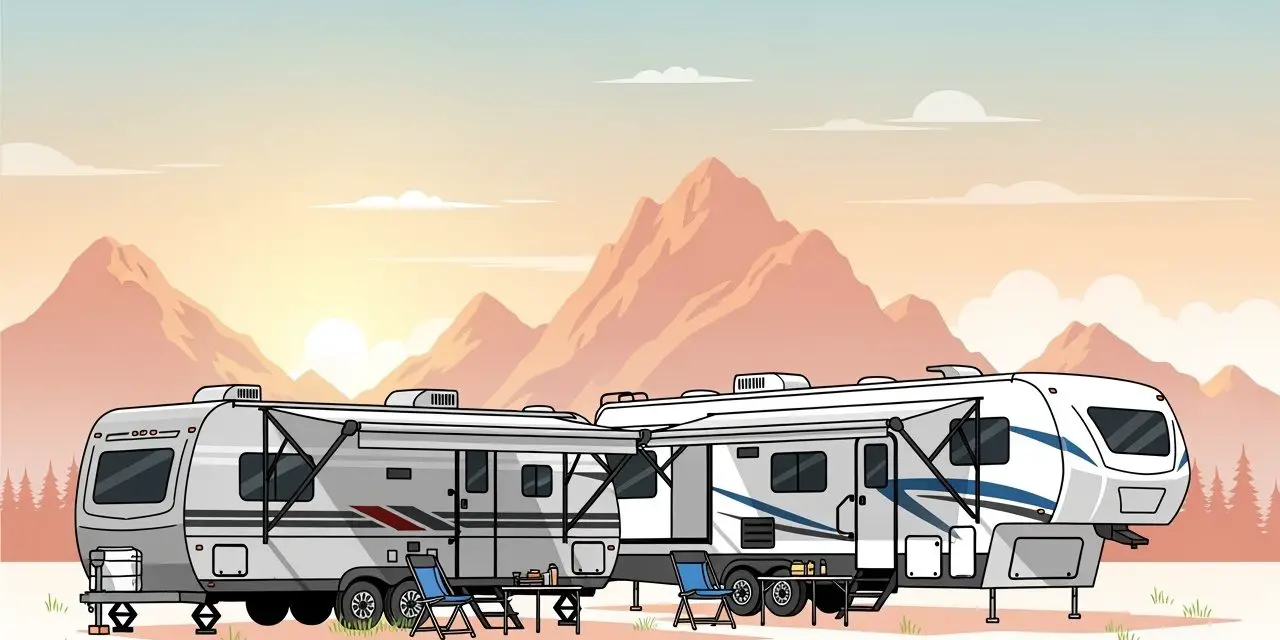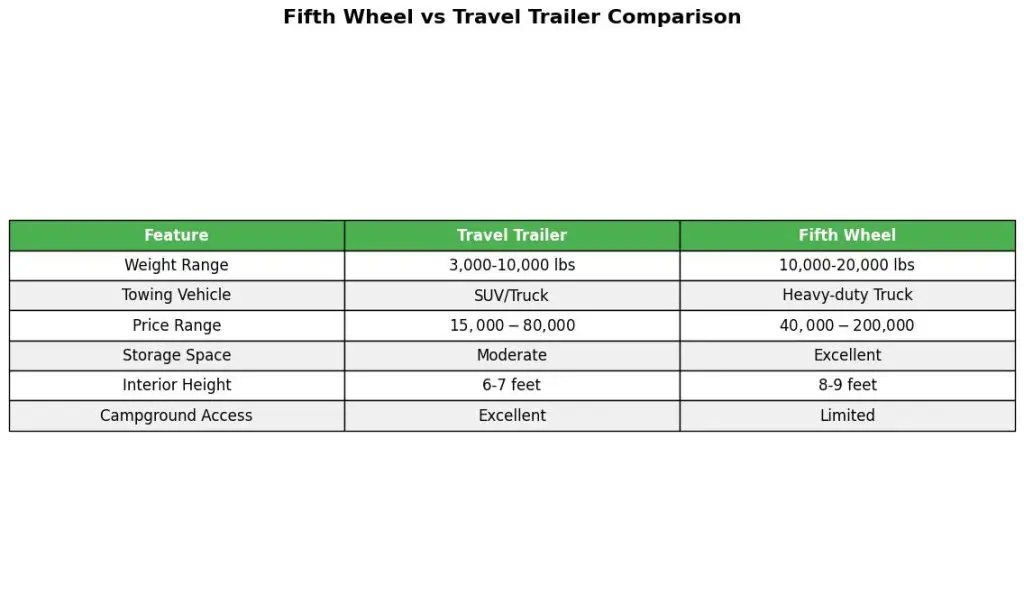Would you like to save this article?
You’re standing at the crossroads of RV ownership, and the age-old debate is raging in your mind: fifth wheel or travel trailer? This isn’t just about picking a camping companion – you’re choosing a lifestyle that will define your adventures for years to come. Both options have passionate followers who swear by their choice, and for good reason.
Travel trailers offer lightweight flexibility and budget-friendly access to the RV lifestyle, while fifth wheels deliver luxury living with smooth towing and spacious interiors. The decision you make will impact everything from your towing vehicle to your campground options, and even your wallet. Let’s dive into the seven crucial differences that will help you make the right choice for your unique camping dreams.
The Market Share Reality Check
Before we dive into the specifics, let’s look at what your fellow RVers are actually choosing. Travel trailers dominate the market with approximately 70% of towable RV sales, while fifth wheels claim about 30%. This isn’t surprising when you consider that travel trailers are the gateway drug to RV life – they’re more affordable and accessible to first-time buyers.
According to the RV Industry Association, travel trailer shipments increased by 17.4% in 2024, while fifth wheel shipments grew by a more modest 2.1%. This data tells a story: more people are getting into RVing than ever before, and they’re starting with travel trailers.
Here’s the thing though – market share doesn’t necessarily mean “better.” It just means more accessible. Fifth wheels might have a smaller slice of the pie, but they’re serving up some seriously luxurious camping experiences that travel trailers simply can’t match.
1. Towing Requirements: Your Truck Matters More Than You Think
The biggest difference between these two RV types comes down to what’s parked in your driveway. Travel trailers connect to a standard hitch ball under your rear bumper, which means you can tow many models with SUVs, minivans, or even some large sedans. Fifth wheels, however, require a kingpin hitch mounted in your truck bed, which means you’ll need a full-size or heavy-duty truck.
This isn’t just about convenience – it’s about thousands of dollars in vehicle costs. A quality half-ton truck starts around $35,000, while heavy-duty trucks can easily exceed $60,000. If you’re currently driving a Honda Pilot or Toyota Highlander, you might be able to tow a travel trailer weighing 5,000-7,000 pounds, but you’ll need a truck upgrade for any fifth wheel.
The 80% rule is crucial here: experienced RVers recommend keeping your loaded trailer weight at 80% or less of your vehicle’s towing capacity. This helps prevent premature wear on your engine, transmission, and brakes.
The reality check is that most people underestimate how much their “stuff” weighs. Add water, food, clothes, and camping gear, and that advertised dry weight can increase by 2,000-3,000 pounds quickly.
2. Size and Storage: Where Fifth Wheels Shine
Fifth wheels are the kings of storage space, and it’s not even close. Most fifth wheels feature a drop-frame construction that creates massive basement storage compartments accessible from both sides. We’re talking about storage areas large enough to hold full-size lawn chairs, grills, and even bicycles.
Travel trailers, constrained by their single-level design, offer significantly less storage. You’ll typically find smaller exterior compartments and limited interior storage options. However, what travel trailers lack in storage, they make up for in maneuverability and campground access.
The interior space difference is equally dramatic. Fifth wheels often feature 8-9 foot ceilings compared to travel trailers’ 6-7 foot heights. This creates a more residential feel and allows for features like kitchen islands, washer/dryer hookups, and multiple sleeping areas.
Storage statistics show that the average fifth wheel offers 30-40% more storage space than a comparable-length travel trailer. This becomes crucial for full-time RVers or those planning extended trips.
3. Price Point: The Great Divide
Let’s talk numbers because your wallet is probably screaming right now. Travel trailers typically range from $15,000 for basic models to $80,000 for luxury units. Fifth wheels start around $40,000 for entry-level models and can easily exceed $200,000 for high-end luxury rigs.
But here’s what the sticker price doesn’t tell you: fifth wheels often include features that would be expensive upgrades in travel trailers. Things like residential appliances, solid surface countertops, and premium sound systems come standard in many fifth wheels.
The total cost of ownership includes more than just the RV purchase. You’ll need to factor in:
- Towing vehicle costs (potentially $20,000-$40,000 more for a capable truck)
- Insurance premiums (fifth wheels cost 15-25% more to insure)
- Maintenance and repairs
- Campground fees (some charge extra for larger rigs)
The budget reality is that getting into fifth wheel ownership typically requires a minimum investment of $80,000-$100,000 when you include the truck, while travel trailer ownership can start around $30,000-$40,000 total.
4. Campground Access: Size Matters
Travel trailers are the clear winners when it comes to campground flexibility. Many state parks and national parks have length restrictions of 30-35 feet, which eliminates most fifth wheels from consideration. Travel trailers, especially those under 30 feet, can access nearly any campground in America.
Fifth wheels face additional challenges beyond length. Their height (often 12-13 feet) can be problematic for tree-covered campgrounds or sites with low-hanging branches. Some RV parks also charge premium rates for rigs over 35 feet.
Campground statistics show that approximately 40% of public campgrounds have restrictions that would eliminate most fifth wheels. This doesn’t mean you can’t find places to camp – it just means you’ll have fewer options and might pay more for RV resort-style campgrounds.
The spontaneity factor is real. With a travel trailer, you can often find last-minute camping spots, while fifth wheel owners typically need reservations and advance planning.
5. Towing Experience: Smooth Sailing vs. White-Knuckle Moments
Here’s where physics becomes your friend or your enemy. Fifth wheels tow significantly better than travel trailers due to their hitch placement over the truck’s rear axle. This configuration provides better weight distribution and virtually eliminates the swaying that can make travel trailer towing feel like a wrestling match with the wind.
Travel trailers, hitched behind the vehicle, are more susceptible to crosswinds, passing trucks, and weight distribution issues. Even with weight distribution hitches and sway control systems, you’ll feel the trailer more than you would a fifth wheel.
Backing up is another story entirely. Fifth wheels have a much tighter turning radius and are generally easier to maneuver in tight spaces. Travel trailers can jackknife more easily and require more skill to back into tight campsites.
The learning curve for fifth wheel towing is generally shorter, especially for new RVers. Many people find they’re comfortable towing a fifth wheel within a few hours, while travel trailer proficiency might take several trips to develop.
6. Interior Layout: Split-Level vs. Single-Level Living
The split-level design of fifth wheels creates possibilities that travel trailers simply can’t match. You might have steps leading up to a bedroom loft, down to a lower living area, or even multiple levels for different functions. This vertical space utilization is fifth wheels’ secret weapon.
Travel trailers stick to single-level layouts, which can feel more cramped but also more connected. Everything is on one level, making it easier to move around and great for families with small children or mobility concerns.
Bedroom privacy is significantly better in fifth wheels. The raised master bedroom, often accessed by stairs, creates a true separation from the living area. Travel trailers typically have bedrooms at one end, separated only by a sliding door or curtain.
Kitchen functionality heavily favors fifth wheels. Many feature full-size residential appliances, kitchen islands, and enough counter space for serious cooking. Travel trailer kitchens are functional but compact, requiring more creativity and planning.
7. Lifestyle Compatibility: Full-Time vs. Weekend Warriors
Your camping style should drive your decision more than any other factor. Weekend warriors and occasional campers often find travel trailers perfect for their needs. They’re easier to store, less expensive to maintain, and you can disconnect the tow vehicle for exploring.
Full-time RVers gravitate toward fifth wheels for obvious reasons. The extra space, storage, and residential feel make long-term living more comfortable. Features like washer/dryer hookups, large refrigerators, and spacious bathrooms become necessities rather than luxuries.
Storage considerations matter year-round. Fifth wheels require tall storage spaces or covered RV storage, which costs $100-$300 per month in most areas. Travel trailers can often fit in standard garages or under basic RV covers.
The disconnect factor is crucial for many RVers. With a travel trailer, you can unhitch and use your tow vehicle for exploring, grocery runs, or day trips. Fifth wheel owners often need a separate vehicle or rely on their truck for all transportation needs.
The Bottom Line: Which One Wins?
The answer depends entirely on your priorities, budget, and camping style. Travel trailers win if you value affordability, flexibility, and the ability to access any campground. Fifth wheels dominate if you prioritize space, luxury, and smooth towing experiences.
For first-time buyers, travel trailers offer a lower-risk entry point into RV ownership. You can test the waters without a massive financial commitment and potentially upgrade later.
For serious RVers planning extended trips or full-time living, fifth wheels provide the space and amenities that make RV life truly enjoyable rather than just bearable.
The market trends support both choices. Travel trailers continue growing rapidly as more people discover RV life, while fifth wheels maintain steady sales among experienced RVers who know what they want.
Meta Description
Discover the 7 key differences between fifth wheels and travel trailers that will transform your RV buying decision. From towing requirements to storage space, we break down everything you need to know to choose the perfect RV for your adventures.
SOURCES
- Fifth Wheel vs Travel Trailer – Find Your Ideal RV Type | RV Buying Guide – Camping World
- RV Sales and Shipments: 2024 Report
- RV Industry Association Statistics
- Go RVing RV Owner Demographic Profile
- 2024 RV Market Analysis – Statistical Surveys






